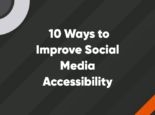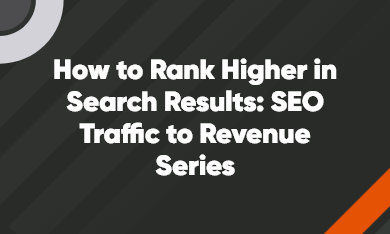
Identifying Focus Keywords: SEO Traffic to Revenue Series

There's nothing more rewarding than when SEO efforts start to generate results. Getting your content ranking higher in search results and driving more traffic to your website is exciting, right?
But is that traffic turning into revenue?
While SEO often gets talked about as a tactic to get your website pages to rank higher in search results, the real goal of SEO is to increase overall revenue. There are many pieces at play that contribute to your ability to grow revenue through SEO.
In this blog series, we're breaking down the process of executing an SEO strategy and capitalizing on the results to ensure revenue growth.
Step one? Identifying the right SEO strategy and keyword focus for your content.
Determining the right keywords
Researching and identifying the right keywords for your content is crucial to finding opportunities to rank higher and get your content to show up for the most relevant queries.
Conducting keyword research helps you understand what people are searching for, how many people are searching for it, and what format they want that information in, which can help you throughout the entire content creation process.
Electing focus keywords requires consideration of the intent, volume, and competition of the keywords you're researching.
Intent
Knowing the searcher's intent with a given keyword is helpful for determining if your content is relevant to that term.
Generally, there are four types of search intent.
Informational
The user is trying to learn something new or conduct general research.
Example keywords: benefits of a website redesign, designing a website, how to design a website
Commercial
The user is conducting research before making a purchase. They are further along in the buyer's journey and are researching specific products or brands.
Example keywords: Minneapolis web design agency, top web design agencies, website design company
Transactional
The user wants to do something specific, like make a purchase or subscribe to a blog.
Example keywords: website designer near me, website design companies near me
Navigational
The user is trying to find a specific page, and they know what they're looking for.
Example keywords: Perrill website development, Perrill website design
Depending on the topic of your content and the stage of the buyer's journey you're trying to leverage, you'll want to pay close attention to search intent.
Let's say you're marketing for a digital marketing agency. You're writing a blog about why it's important to invest in a new website that informs readers of the many reasons why investing in a new website results in a large ROI. For this blog, you'll want to focus on informational keywords like "why hire a website designer" because searchers are looking to learn more about the website design process, giving you an opportunity to grow trust with your audience and share your knowledge.

The results above were pulled using SEMrush, a keyword research tool. Tools like this are great for understanding the intent of a keyword at a glance, but even if you have an SEO tool at your disposal, you should always conduct a Google search for each keyword. You can determine the intent of a keyword by evaluating the SERP and understanding the content that Google's ranking, which paints a much clearer picture of whether or not the keyword makes sense for your content.
For example, if you're targeting the keyword "Minnetonka digital marketing agency" and search it in Google, the results page will pull a local map pack, listing aggregators, and agency service pages rather than blog posts about the benefits of designing websites.
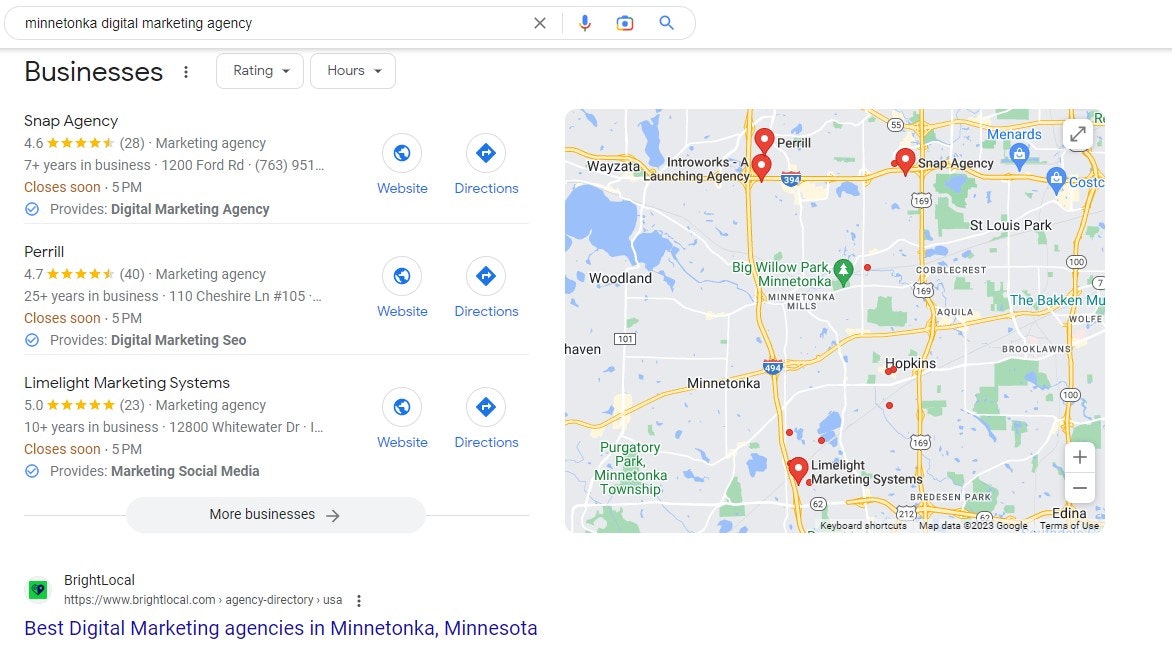
This clearly shows that the intent behind the search isn't to learn more about the importance of digital marketing or how digital marketing can benefit businesses but rather to learn about local digital marketing agencies. Your blog post wouldn't rank on this page, so you would either need to target a different keyword for your blog post, or you would need to create a different kind of content for this specific keyword.
Volume
The next thing to consider when researching keywords is the search volume. If you're going to select a keyword, you should probably know how many people are searching for it each month. But note that taking a keyword's volume at face value and not looking into intent or difficulty is sure to lead you astray. A keyword with little-to-no volume but high intent can provide you with less traffic than ranking at the top position for a high-volume keyword, but the traffic you do get will be extremely relevant to your web page, resulting in more conversions.
Low-volume search queries often have much less competition, which we'll talk about in the next section. If the keyword is closely related to your content's subject matter, it's likely you'll grab more traffic. Sometimes it makes sense to go after zero-volume keywords if they're extremely relevant to your content. Those keywords might only get searched a few times a month, but again, those searches will be very specific to your web page.
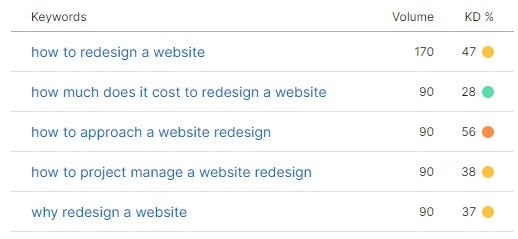
The easiest way to research volume is with a keyword research tool like SEMrush. In the above image, you can see how SEMrush shares the search volume for each keyword. You can also use a free tool like Google Trends to compare keywords. Google Trends doesn't share actual keyword volume, but you can use it to compare high-volume keywords or to determine if there is seasonality for a specific term based on the annual flow of traffic.
Regardless of the tool you choose, make sure to cross-reference your findings.
Competition
Competition is the last major aspect of keyword research. When you're researching keywords, you'll find some that have high competition, and some that have much lower competition. Both types of keywords come with their own unique advantages, depending on your goals and keyword strategy.
Your initial reaction to competitive keywords might be to stay away as they can take some time and dedication to rank for. While a competitive keyword, like "web design", will take longer to rank for, it's not impossible. If a high-competition keyword is something you're interested in targeting, it makes sense to start optimizing your content and targeting it earlier rather than later to get the process moving. You'll likely be up against high-authority sites, so starting to earn backlinks early on will help you optimize for that keyword and will also help your other site pages perform better.
It's also important to note that even though people often discuss ranking number one as a big goal of SEO, it might be enough to just rank somewhere on the first page of SERPs. It depends on the brand, industry, and strategy. For example, if you're a local hardware store competing with big box names like Home Depot and Menards, it could take years of optimization to reach the top spot – or you might never reach it. When you're competing against huge companies like that, it might be just as effective to show up on the first page of results just below them. People who are searching for "hardware store near me" already know about the Home Depots and Menards of the world, so if they intend to click on them, they will. If they're looking for a local option, they'll scroll to find you instead. This is an example where you need to understand who your competition really is and make sure you are beating them.
Of course, you can also go after keywords that have less competition to get content ranked faster. You won't need to build many backlinks and can rely on your subject matter expertise to create quality content.
Lower-competition keywords are also great for building up your site authority, which can help your other site pages rank higher, too – especially if those keywords are high-intent.
In that same image above, SEMrush indicates the keyword difficulty. It's convenient to use the tool to compare similar keywords and to find ones you're more likely to rank for. The platform can also determine the top competitors for a keyword and the competitive density. When you're looking at competition, make sure you're keeping the metric in context with intent and volume. The three components together will help you determine the best keyword and content strategies.
Be aware that keyword research tools don't paint a complete picture of keywords, though, and that each tool has its own way of determining how to measure keyword metrics. It's best practice to conduct your own research on Google and to use your best judgment when it comes to keywords. You can also check other keyword tools to see how the results differ from tool to tool to give you a better idea of the accuracy.
By searching for the keyword and noting which sites are currently ranking for that term, you can see how many backlinks you might need and the type of content that searchers want to see, all from the SERPs.
Tips to successfully implement your keyword strategy
Using keywords in your content will help you generate more qualified traffic, which over time, will turn into revenue. Here are a few final tips to get you started:
- Once you've identified your focus keywords, use your primary keyword within the first paragraph of the page, in the page URL, in the meta description, in subheaders, and multiple times throughout the body copy. This will reinforce your keyword and tell the search engine which query you want your content to show up for.
- Refrain from using keywords too often. Yes, you need to use your keyword, but there's a fine line between optimizing keywords throughout the page content and going overboard. Don't force keywords into your copy; keywords should make sense and not take away from readability – you want your content to appeal to both people and search engines.
- Lastly, make sure you're actually doing your research. While keyword research tools are invaluable, going straight to the SERPs and checking out your competition for yourself is just as important. You can search for your query, look at the content that's currently ranking high, and try to distinguish your content by adding something new or valuable.
Next steps
Researching and identifying keywords is like laying the SEO foundation. Now you'll need to optimize your content to rank higher in search results.
As experts in SEO strategy and execution, the Perrill team can help you throughout this process. Our unified digital approach means we'll pair our SEO knowledge with digital marketing expertise to make sure your company sees lasting measurable business results.
Reach out to learn more about what a unified digital approach can do for your company. We look forward to helping you win online.

Grace Hallen
Author
Grace Hallen
Categories
Date
Explore with AI
Join Our Newsletter

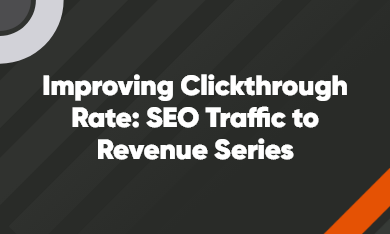
Improving Clickthrough Rate: SEO Traffic to Revenue Series


